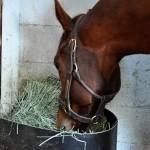Dental Care and Fecal Fiber Length in Horses

Horses begin to break down the structural carbohydrates of forage in their mouths through the simple act of chewing. Routine dental care helps them chew properly, ensuring feed is ground into small, digestible pieces. Horses can then efficiently ferment the feed in the hindgut to derive as much energy as possible from it and are less likely to colic due to impaction of unchewed forages. How do you know if your horse’s dental care is up to par?
“Analyzing fecal fiber length can help assess the state of a horse’s oral care. If the fibers are longer, the forage is not being broken down sufficiently prior to reaching the hindgut. In contrast, shorter lengths of fiber would indicate the teeth are capably breaking down the forage,” explained Kathleen Crandell, Ph.D., a Kentucky Equine Research nutritionist.
Studies have been conducted in the past to determine if fecal fiber length reliably measures oral health, yet results of those studies proved contradictory. Brazilian researchers recently tackled this topic again, consciously limiting the variables that might have accounted for inconsistent results in previous trials.
In their study*, Di Filippo and colleagues recruited adult horses that had no history of routine dental care. All horses were thoroughly assessed for dental disorders, such as sharp enamel points; overgrowths; shear, step, or wave mouth; and diastema. Horses then underwent appropriate dental corrections and were fed only timothy hay for 15 days. Fecal fiber length was measured twice: on day 0 of the study, when dental correction was performed, and on day 15.
Researchers found dental correction resulted in a significant reduction in fecal fiber length, suggesting that dental care increases chewing efficiency and decreases fecal fiber length. Fecal fiber length, therefore, could be an indicator for oral health, according to this study.
“Another way of ensuring hindgut health, minimizing colic, and maximizing fermentation to avoid weight loss is offering a hindgut buffer such as EquiShure. This product helps maintain an appropriate pH in the hindgut to support appropriate fermentation,” advised Crandell.
Horses can often meet their energy requirements on all-forage diets, but certain nutrients might be deficient. In these instances, a well-formulated vitamin and mineral supplement should be part of a horse’s diet.
*Di Filippo, P.A., V. Vieira, D.A. Rondon, et al. 2018. Effect of dental correction on fecal fiber length in horses. Journal of Equine Veterinary Science. 64:77-80.








